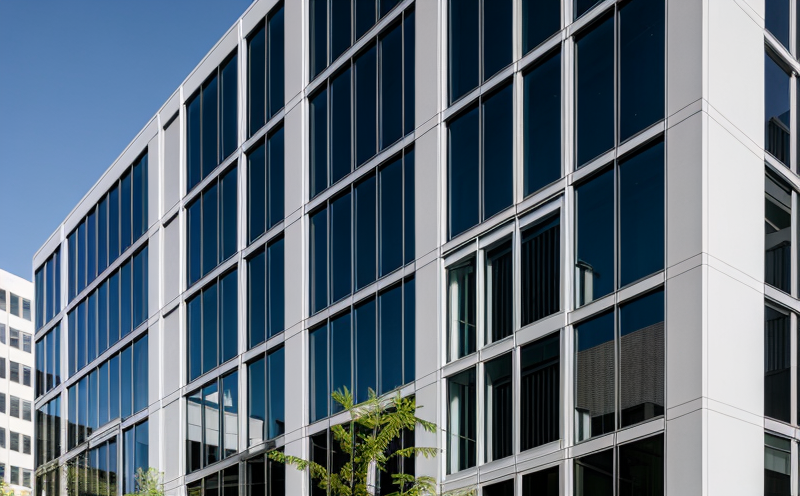ISO 12311 Thermal Expansion Coefficient Testing
The ISO 12311 standard provides a method to determine the thermal expansion coefficient of glass, ceramic, and façade materials. This property is crucial for ensuring that building materials can withstand environmental changes without compromising structural integrity or performance.
Thermal expansion coefficients are measured by subjecting specimens to controlled heating and monitoring their dimensional changes using precision instrumentation. The results help in understanding the material's response to temperature fluctuations, which is essential for applications like architectural glass, ceramic tiles, and building facades.
The testing procedure involves precise specimen preparation, often requiring flat samples with uniform thickness and free from defects that could skew the results. The heating rate and environmental conditions are strictly controlled to avoid external influences on the test outcome.
For accurate measurement, specialized instruments such as dilatometers or laser interferometers are used. These tools provide high-resolution data that can be analyzed to calculate the thermal expansion coefficient with a high degree of accuracy.
The significance of this testing cannot be overstated for quality managers and compliance officers working in sectors like construction and architecture. It ensures that materials meet regulatory standards, such as those set by ASTM C627, EN 13988, or ISO standards. For R&D engineers and procurement teams, the ability to predict how a material will behave under varying temperatures is invaluable for innovation and cost-effective sourcing.
The thermal expansion coefficient of glass and ceramics can vary widely depending on their composition, manufacturing process, and application. Understanding these properties helps in selecting materials that are suitable for specific environments, such as high-temperature industrial settings or regions with extreme temperature variations.
- Materials Tested: Glass, ceramic tiles, façade components
- Environmental Factors: Temperature fluctuations, humidity levels
- Testing Equipment: Dilatometers, laser interferometers, thermal expansion analyzers
- Data Analysis: Regression analysis, correlation coefficients
The importance of this test lies in its ability to provide critical data that can influence design decisions and material selection. It ensures that the materials used in construction projects are reliable and capable of withstanding the thermal stresses they will encounter during their lifecycle.
In summary, ISO 12311 Thermal Expansion Coefficient Testing is an essential process for ensuring the durability and performance of glass, ceramic, and façade materials in building applications. By providing accurate data on how these materials respond to temperature changes, it supports best practices in material selection and compliance with international standards.
Benefits
The benefits of ISO 12311 Thermal Expansion Coefficient Testing extend across various aspects of building construction and maintenance. Here are some key advantages:
- Enhanced Durability: Materials that have been tested for thermal expansion coefficients are more likely to withstand environmental changes without cracking or deforming.
- Improved Compliance: Ensures adherence to international standards like ASTM C627, EN 13988, and ISO 12311, which is crucial for regulatory compliance in the construction industry.
- Informed Decision-Making: Provides R&D engineers with data that can influence design decisions, leading to more innovative and efficient building solutions.
- Precision Engineering: Accurate testing results lead to better precision engineering practices, which are essential for complex architectural projects.
Incorporating this test into your quality assurance process can significantly enhance the reliability of materials used in construction. It ensures that the buildings and facades you design and construct are not only aesthetically pleasing but also structurally sound and resilient to environmental challenges.
Eurolab Advantages
EuroLab offers a comprehensive suite of services for ISO 12311 Thermal Expansion Coefficient Testing, providing clients with the expertise needed to meet stringent quality and compliance requirements. Here's why choosing EuroLab is advantageous:
- State-of-the-Art Facilities: Our laboratories are equipped with advanced testing instruments that ensure accurate and precise results.
- Certified Personnel: Our team of experts is trained in the latest testing methodologies, ensuring consistent quality in all our services.
- Comprehensive Reporting: We provide detailed reports that include all relevant data, analysis, and recommendations to help you make informed decisions.
- Expert Consultation: Our consultants can guide you through every step of the testing process, from specimen preparation to final interpretation of results.
EuroLab's commitment to excellence in laboratory services is unmatched. We pride ourselves on delivering accurate, reliable, and timely test results that meet international standards. Whether you're a quality manager or an R&D engineer, EuroLab is your trusted partner for all your testing needs.
Why Choose This Test
The ISO 12311 Thermal Expansion Coefficient Testing is critical for several reasons. First and foremost, it ensures that the materials used in glass, ceramic, and façade applications can withstand temperature changes without compromising their structural integrity.
- Reduces Risk: By testing thermal expansion coefficients, you reduce the risk of material failure due to thermal stress.
- Saves Costs: Early identification of materials that may not perform well under extreme temperatures can save costs on rework or replacement.
- Enhances Reputation: Compliance with international standards like ISO 12311 enhances the reputation of your products and services in the market.
- Promotes Innovation: Accurate testing data allows for more informed design decisions, leading to innovative building solutions.
In addition to these benefits, EuroLab's expertise ensures that you receive reliable test results, which are essential for maintaining high standards of quality in your projects. Choosing this test is a proactive step towards ensuring the longevity and safety of your constructions.





